

Hemingway Editor. When to Use Which or That. When to use which or that has always been known as one of the most grammatically confusing grammar lessons ever taught.
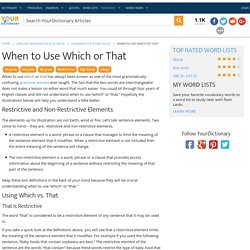
The fact that the two words are interchangeable does not make a lesson on either word that much easier. You could sit through four years of English classes and still not understand when to use “which” or “that.” Hopefully the illustrations below will help you understand a little better. Restrictive and Non-Restrictive Elements The elements up for illustration are not Earth, wind or fire. A restrictive element is a word, phrase or a clause that manages to limit the meaning of the sentence element that it modifies.
Semicolons - GrammarBook.com Mobile. It's no accident that a semicolon is a period atop a comma.
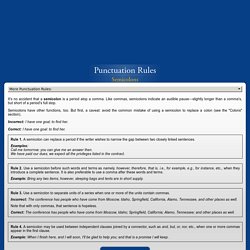
Like commas, semicolons indicate an audible pause—slightly longer than a comma's, but short of a period's full stop. Semicolons have other functions, too. But first, a caveat: avoid the common mistake of using a semicolon to replace a colon (see the "Colons" section). Incorrect: I have one goal; to find her. Correct: I have one goal: to find her. Rule 1. Jennifer Walker » Grammar Help: Me, Myself, or I? Deciding whether to use me, myself or I in a sentence is one of the most common grammar mistakes people make.
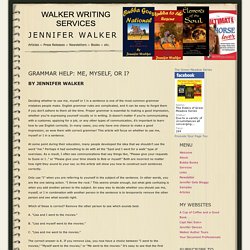
English grammar rules are complicated, and it can be easy to forget them if you don’t adhere to them all the time. Proper grammar is essential to making a good impression, whether you’re expressing yourself vocally or in writing. It doesn’t matter if you’re communicating with a customer, applying for a job, or any other types of communication, it’s important to learn how to use English correctly. In many cases, you only have one chance to make a good impression, so wow them with correct grammar! This article will focus on whether to use me, myself or I in a sentence. At some point during their education, many people developed the idea that we shouldn’t use the word “me.” I/me/myself/ In the old days when people studied traditional grammar, we could simply say, “The first person singular pronoun is ‘I’ when it’s a subject and ‘me’ when it’s an object,” but now few people know what that means.
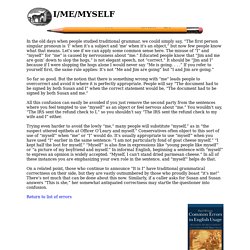
Let’s see if we can apply some common sense here. The misuse of “I” and “myself” for “me” is caused by nervousness about “me.” Educated people know that “Jim and me are goin’ down to slop the hogs,” is not elegant speech, not “correct.” It should be “Jim and I” because if I were slopping the hogs alone I would never say “Me is going. . . .” If you refer to yourself first, the same rule applies: It’s not “Me and Jim are going” but “I and Jim are going.” So far so good. Biennial vs. biannual – The Correct Way to Use Each. Nothing Says Over 40 Like Two Spaces after a Period! (Before I start, I should mention that I am over 40, so I can make fun of the over 40.

So there.) I learned to type in 1987 on an IBM Selectric typewriter. A typewriter, not a computer. We had those, but they had big, actually floppy disks and honest to God, no one had any idea what to do with them. My semester of typing remains one of the most valuable classes I ever took in high school — I can still dazzle small children with my ability to make words appear on a screen by just spazzing my fingers out on the keyboard. But one rule from typing class has definitely expired, and if you’re over 40, it’s possible that no one has given you the message. Unless you are typing on an actual typewriter, you no longer have to put two spaces after a period. Or a question mark. Yes, really. Here’s why: Back when we used typewriters, every character was given the exact same amount of space on the page. Vitriol. Irascible. Apropos of nothing. Wordorigins.org. Instant Grammar Check - Plagiarism Checker - Online Proofreader. Gotcha!
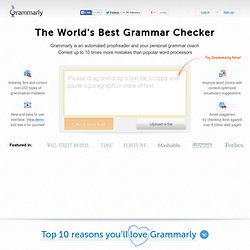
Grammarly texts are already correct You cannot improve on perfection. We have already proofread Grammarly website and fixed all mistakes. Please check another text or use a sample to see Grammarly in action. This text is too short. Errors. Five Grammatical Errors That Make You Look Dumb. Between you and me vs Between you and I. Between you and me, the phrase "between you and I" grates on my ears like nails on a chalkboard.
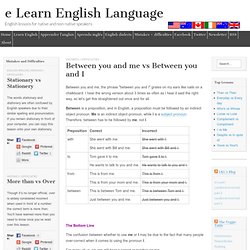
I hear the wrong version about 3 times as often as I hear it said the right way, so let’s get this straightened out once and for all. Between is a preposition, and in English, a preposition must be followed by an indirect object pronoun. Me is an indirect object pronoun, while I is a subject pronoun. Therefore, between has to be followed by me, not I. The Bottom Line The confusion between whether to use me or I may be due to the fact that many people over-correct when it comes to using the pronoun I.
And vs. In addition. Common Mistakes and Confusing Words in English - Learn English Mistakes. Between You and I or Me? Between you and me vs Between you and I. Common Errors in English Usage. Use the search form below to find words and phrases on this site.
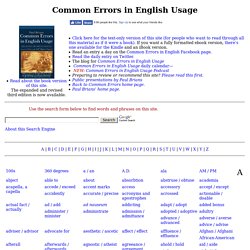
About this Search Engine E e.g. / i.e. Each early adapter earmarks / hallmark earth, moon easedrop ecology / environment economic / economical ecstatic ect. Five Grammatical Errors That Make You Look Dumb. Common Mistakes and Confusing Words in English - Learn English Mistakes. And vs. In addition. Forvo: the pronunciation guide. All the words in the world pronounced by native speakers. How to pronounce Achille Castiglioni. Learn English Grammar - GrammarCamp. Grammar Gang. Avoiding Plagiarism: Quoting and Paraphrasing. Paraphrasing is often defined as putting a passage from an author into “your own words.”
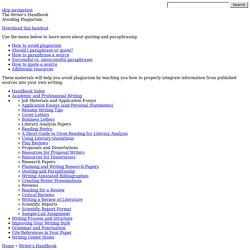
But what are your own words? How different must your paraphrase be from the original? The paragraphs below provide an example by showing a passage as it appears in the source, two paraphrases that follow the source too closely, and a legitimate paraphrase. The student’s intention was to incorporate the material in the original passage into a section of a paper on the concept of “experts” that compared the functions of experts and nonexperts in several professions. The Passage as It Appears in the Source Critical care nurses function in a hierarchy of roles. Using Clauses as Nouns, Adjectives, and Adverbs. The Semicolon. The exact rules for quotation marks vary greatly from language to language and even from country to country within the English-speaking world.
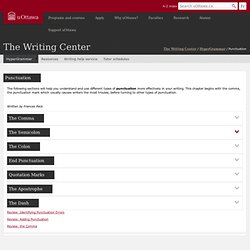
In North American usage, you should place double quotation marks (") before and after directly quoted material and words of dialogue: One critic ended his glowing review with this superlative: "It is simply the best film ever made about potato farming. " May replied, "This is the last cookie. " You also use quotation marks to set off certain titles, usually those of minor or short works -- essays, short stories, short poems, songs, articles in periodicals, etc. Height v. Heighth: MDIC Word Deathmatch Vol. I – My Dog is Chelsea. Words that are not actually words drive me nuts. I’m not talking about useful made-up words like “janky” (which means “crappy”) or “trotch” (an excellent swear word). Those kind of words are fine.
List of Transition Words. Anyone who has ever received criticism about a written assignment has quite possibly been told to use more transition words, which is where this list of transition words come in handy. List of Transition Words While you do not want your paper or other written piece to sound like a long string of transition words, consider adding some of these suggestions when appropriate in order to spice up your work and to make the sections flow more smoothly from one to another. Reference / words to know.
List of Transition Words. Language Tips: Lastly or finally & fraction or percentage. Weekly Language Usage Tips: Winter Wonderland Edition Tip 1: Lastly or finally A reader writes: Can you write about lastly versus finally? Yes, I can. English grammar rules. Index of English grammar rules, for learners and teachers For vocabulary, go to elementary/pre-intermediate vocab or intermediate/advanced vocab. Tenses List of all English tensespresent simple, past simple, present perfect . . . How is "contrarily" different from either "conversely" or "inversely" The three words have a similar flavor and considerable overlap. Prefer contrarily when you are emphasizing disagreement. Prefer conversely when things are flipped over where left becomes right and right becomes left.
Prefer inversely when thing are flipped such that top becomes bottom and bottom becomes top. 117445502752024579_tMQfujO9_c.jpg (JPEG Image, 425 × 700 pixels) - Scaled (91. Grammar Newsletter - English Grammar Newsletter. The Oxford Comma-otion. Punctuation Rules. Commas and periods are the most frequently used punctuation marks. Commas customarily indicate a brief pause; they're not as final as periods. Rule 1. Use commas to separate words and word groups in a simple series of three or more items. English Grammar. Into/In To; Onto/In To. IPA for English. Throughout Wikipedia, the pronunciations of English words are conveyed by means of the International Phonetic Alphabet (IPA); for a basic introduction to IPA, see Help:IPA/Introduction. In particular, the following tables list the relevant transcription for various English diaphonemes; for a more complete key, see Help:IPA, which includes sounds that do not occur in English.
(If the IPA symbols are not displayed properly by your browser, then see the links at the bottom of this page.) If you feel it is necessary to add a pronunciation respelling using another convention, then please use the conventions of Wikipedia's pronunciation respelling key. Dialect variations This key accommodates standard General American, Received Pronunciation, Canadian English, South African English, Australian English, and New Zealand English pronunciations. Customer Discussions: Mispronounced and Misspelled Phrases. "as such" does not mean "therefore" « bkmarcus.com. Frequently Asked Questions. Lesson Tutor : How Does the Effect Affect You? Learn when to use each correctly. Affect vs. Effect Grammar Rules. Verbs, Adjectives, Nouns - Beginners/Elementary. Affect Versus Effect.
I get asked whether to use affect or effect all the time, and it is by far the most requested grammar topic, so I have a few mnemonics and a cartoon to help you remember. W - Common Mistakes in English - Good vs. Well. Good is often mistakenly used in place of well by both native and non-native speakers. W - Grammar Girl : Good Versus Well. W - An English-Zone.Com Quiz: Good or Well. Sayings & Quotes / PLEASE! Punctuation and Capitalization Rules. The Blue Book of Grammar and Punctuation. Punctuation Rules. Ie example colon or semi colon? Grammar Tips & Tidbits Archive. W - too with a comma? THE WRITE (right) WAY: 8 Commonly Misused Words.
Five Habits to Avoid in Academic Writing. All About Nouns. Appose/oppose. Frequently Asked Questions - English Language and Usage - Stack Exchange. Word choice - "opposed" as apposed to "apposed"? - English Language and Usage - Stack Exchange. Not Sure When to Use Capitalization? "in hindsight" = "in retrospect"? - UsingEnglish.com ESL Forum. Punctuation Art at AllPosters. Punctuation.jpg (JPEG Image, 336x450 pixels) Modern English, Punctuation, and Word Separation. Campy. What is a Preposition?
What is an Adverb? What is an Adjective? What is a Verb? What is a Pronoun? What Is the Difference Between Its and It's? 10 Words You Need to Stop Misspelling. English 101. Supposedly is supposably incorrect? Supposively. Ten Common but Easily corrected Errors. Supposably2.jpg. Irregardless Versus Regardless : Grammar Girl.